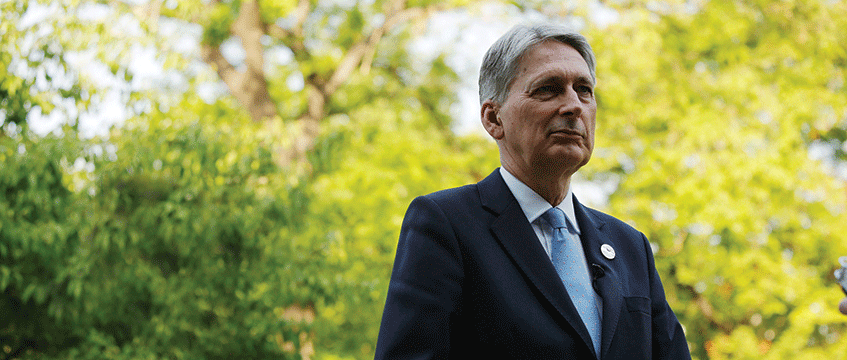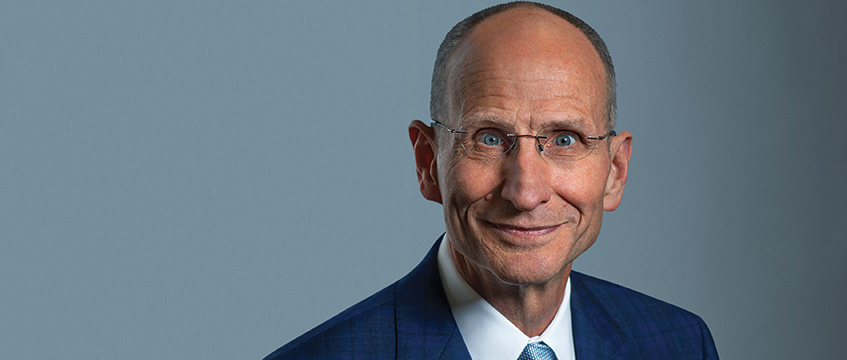The EG Interview: Former chancellor Philip Hammond
When Philip Hammond, now Lord Hammond of Runnymede, was chancellor of the exchequer, he had a clear focus on bringing austerity to an end. He reduced the UK deficit from 10% of GDP in 2016 to just 1.2% by the time he left office in 2019. Austerity, most closely linked with his predecessor George Osborne but maintained by Hammond, was almost over.
Then 2020 happened. That deficit is now expected to reach 17% in 2020/21, according to the Institute for Fiscal Studies, a figure more than six times the level forecast in the March Budget and a level never seen in the UK outside of the two world wars of the 20th century.
When Philip Hammond, now Lord Hammond of Runnymede, was chancellor of the exchequer, he had a clear focus on bringing austerity to an end. He reduced the UK deficit from 10% of GDP in 2016 to just 1.2% by the time he left office in 2019. Austerity, most closely linked with his predecessor George Osborne but maintained by Hammond, was almost over.
Then 2020 happened. That deficit is now expected to reach 17% in 2020/21, according to the Institute for Fiscal Studies, a figure more than six times the level forecast in the March Budget and a level never seen in the UK outside of the two world wars of the 20th century.
The growth in that deficit is, of course, the result of the government’s spending in wake of the Covid-19 pandemic, as current chancellor Rishi Sunak hands out tax cuts and incentives to keep UK plc afloat. It is a popular move by a populist government and one that has made Sunak the “most popular member of the government”, says Hammond. But, he adds quickly, that popularity is unlikely to last.
Here Hammond, a real estate man at heart, having founded Castlemead in 1984 and now advising lender OakNorth Bank, talks to EG about his view of the UK economy, the shocks the country is sure to face from the pandemic, Brexit and the US election, the impact of the fourth industrial revolution on the way we work, the challenges we face in the fight to become more sustainable and the role of real estate in the new normal.
Structural change is unavoidable, says Hammond. Everything the government and businesses are doing now will not be able to stop the inevitable, long-term and structural change being brought about by the current situation.
That change was coming anyway, he says. But now it has been accelerated.
“The government cannot protect the public, businesses, workers against that structural change,” Hammond says. “And frankly, it should not try. In the short term we protect jobs and businesses against what has been a liquidity crisis. But in the longer term, we have to protect people, not individual jobs and businesses.”
He says that lessons from the UK’s economic history are very clear and that it is a mistake to try to resist the need for structural change.
“It only means that the pain of the adjustment is greater and the resumption of economic growth takes longer,” says Hammond.
A current recovery, of course, depends on the development of a vaccine for Covid-19, but how effective that vaccine may be and when it might be available remain unknown. It will not be a complete solution. It will not be a silver bullet. The new normal and our gradual move to it, says Hammond, will be different to the old normal, and it will not be pain-free.
The trauma of change
The new normal inevitably comes with tax rises, some trauma and a change in investment patterns.
“This is a populist government, and giving money away is generally more popular than taking it back,” says Hammond, speaking from experience as a chancellor who came under pressure to bring austerity to an end. “But the government will have to halt and eventually reverse the crisis spending that we’ve seen over the last eight months.
“I would expect that we will see some high-profile tax increases on unpopular groups of the population – companies, foreigners, rich people,” he says. “And definitely some taxes on anybody who looks as though they may have made a windfall out of the Covid crisis.”
But, says Hammond, those tax rises will not come any time soon. Certainly not until after the next General Election.
“Populist governments do not generally like to tell ordinary people that they are going to have to pay more to contribute to paying off the debts that have been run up during the crisis we’ve just been through,” says Hammond. “So borrowing will take the strain, at least for the next few years.”
And it is the next few months and years that the UK economy needs to focus on navigating before it can move, decisively, to make the structural adjustments needed for it to thrive in the new normal.
Some certainty around Brexit should become clear at the end of this year, providing at least some insight into what that new normal looks like, but also making the UK’s recovery from the crisis very different to every other country’s.
“We should be in no doubt that, whether we get a deal or not, there will be a shock to the UK economy at the end of the year,” says Hammond. “The facts are simple. Over 40% of our exports go to the European Union. A huge part of the value added in the UK economy is generated in supply chains that criss-cross the border between the UK and the European Union. Whether there is no deal or a skinny deal at the last minute, there will be a shock.
“The difference between no deal and a light-touch deal will be whether we have tariffs or not on our manufactured goods and, perhaps more importantly, in the mood music between the UK and the European Union. If we do have a deal, however light-touch, I think the mood will lighten, and it’s possible that we’ll be able to build on it in the future. If there is no deal, relations are likely to go into the deep freeze. A deal is infinitely better, but both will be a big shock.”
Brexit, Covid, even the US election and the impact that may have on global trade, particularly if China is pushed into building a trade bloc of its own, are not the only big shocks the UK economy and its businesses and populace will have to deal with.
Disruption ahead
The impact of the fourth industrial revolution, our accelerating digital and technological transformation, and the increasingly loud ticking of the climate change time bomb will also bring around fundamental and uncomfortable change.
For Hammond, the fourth industrial revolution will be both hugely disruptive and hugely exhilarating, bringing about more change than even Covid has.
“It will have big impacts on the pattern of global trade as we see reshoring becoming a genuine possibility as the benefits of economies of scale and the significance of cheap labour decline as production processes are fully automated,” Hammond says. “A return to localism as economies of scale disappear, the age of mass production perhaps coming to an end and a new bespoke economy where even people on modest incomes can afford to have things designed and made to their specific requirements by computer-driven, fully automated production systems. But change will be traumatic. There will be huge churn. Many jobs lost as new jobs are created. Old skills will become redundant and new skills will be required.”
That will not sit comfortably with everyone. There will be effort needed to bring a sceptical population, those frightened by change, along for the ride. A necessary but probably bumpy ride.
Hammond expects the same scepticism around the country’s pledge towards carbon neutrality and the fear around the necessary change required to reach it.
“Government and all political parties are clearly committed to the energy transition and decarbonising our economy, but we live in a democracy, so we’ve got to take the people with us,” says Hammond. “And depending on how fast our economy is growing, it is possible to envisage periods over the next 30 years when making the level of investment needed to get to net zero by 2050 will involve foregoing other investment that might feel important to the public.
“New hospitals, new schools, more roads, whatever it is, may have to be foregone because of the commitment we’re making to invest what the Treasury has estimated will be around £2tn. Maintaining public support for that investment programme is going to be crucial to enabling it to happen.”
“For many of our citizens,” says Hammond apologetically, “it may feel like a further period of austerity.”
Strength in resilience
But there are reasons to be cheerful, even from a former chancellor who freely admits he would never be as popular as Sunak.
The UK does face the challenge of operating in a post-Brexit world, it does face the ongoing issue of closing its productivity gap and the deepening divide between the North and the South, but the UK economy has shown itself to be diverse and resilient, which according to Hammond are two of its great protectors.
“We have some unfair advantages – drives the French mad,” says Hammond cheekily, highlighting the UK legal system, our educational institutions, world-leading standing in service provision and entrepreneurial flair.
And, says Hammond, the UK has a real estate sector that has traditionally played a vital role in rebuilding our economy following a recession and likely will again.
But, he adds, if real estate really wants to make sure its “vital role” is respected and understood, and the sector is supported through the unavoidable structural changes that face us all, it needs to do much better in making its voice – a singular, agreed voice – heard.
“Let me give away a state secret for nothing,” says Hammond, minutely dropping his voice. “I can tell you as the former chancellor that it was a routine experience to have an industry representative group come in to see me… often with chairmen or chief execs of some of the largest businesses in that sector, and present an industry-agreed position only to then get messages or calls from two or three of those very senior participants over the next few days saying: ‘Actually, we don’t entirely agree with the sector position that we presented to you in that meeting. And we just want to let you know what our view is.’
“When government gets conflicting messages from an industry group, it becomes quite difficult to formulate a policy response and quite easy – if you’ve got lots of other challenges on your agenda – just to put the issues of that sector to one side.”
It’s a thread that has run through the whole of EG’s Future of UK Cities event, at which Hammond delivered a keynote speech. Collective actions, single, agreed voices with a purpose, have the power to bring about real change.
As Hammond says, that change is unavoidable. And if the industry wants to ensure its voice is heard at the Cabinet table, there is another unavoidable truth: it has to speak with one voice. Especially in these austere times.
Hammond on…
The future of real estate
“Real estate will be in the front line of change. The long lease structure means the impact of that change may be delayed in its full effect, but as we see retail continue to decline, as we see the demand for office space changing – perhaps in total quantum, certainly in terms of the pattern of that demand – we will see the real estate industry being faced with some very significant challenges and very significant structural change over the years and decades ahead.”
Navigating the new economy
“Population, demographics and the impact of technology on employment make deflation a much bigger risk than inflation. Asset values may inflate further in the short term, but as populations fall and economies start to shrink, real asset prices must surely begin to fall. Working out how to prosper in a deflationary world of falling asset prices may well be the key to commercial success over the next 50 years or so.”
Building bridges, not barriers
“It is not in the best economic interests of the citizens of this country that we try and cut ourselves off in some kind of autarchic structure separate from the rest of the world, hidden behind protectionist walls. That is not going to be the route to prosperity for Britain in the future.”
Propping up failing businesses
“It does not make sense to use taxpayers’ money to go on propping up jobs or businesses in the short term if they have no long-term prospects. Far better to release those resources, support the people involved directly and help them retrain and reskill for the jobs of the future.”
The devolution agenda
“Highly centralised systems like ours have performed less well than more devolved systems like Germany or even the United States. I would expect that we’re going to see a strong pressure for more devolution of power within the UK so that decisions that affect local areas are made far more at local levels, particularly in the big urban conurbations.”
Changing infrastructure spending
“If people are going to work from home for part of the week and commuting into our cities becomes a part-time activity, many of the big transport infrastructure projects that we thought were our top priority just a few weeks or months ago may no longer seem as necessary as they once did.”
Rishi Sunak
“The chancellor spent the last six months giving money away. That’s generally easier than taking it back. And he knows that he’s going to have to curtail the largesse of government and then start to recover some of the cost of this crisis over the coming years. And that’s going to be a much more difficult challenge.”
To send feedback, e-mail samantha.mcclary@egi.co.uk or tweet @samanthamcclary or @estatesgazette
Main picture © FLORENCE LO/POOL/EPA-EFE/Shutterstock Secondary picture © AP/SHUTTERSTOCK











